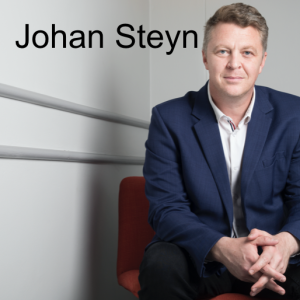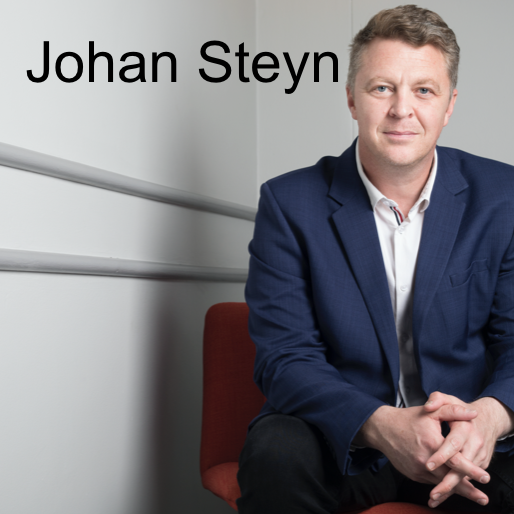Episodes

4 days ago
4 days ago
In this heartfelt interview with PowerFM’s Pabi Moloi, Johan Steyn shares his personal journey of adopting his son—and explores how technology like AI and blockchain could help fix South Africa’s broken adoption system. With over 1.8 million children needing homes, Johan discusses how digital tools can bring speed, transparency, and compassion to a process buried in red tape. A powerful blend of love, purpose, and tech-for-good.

Friday May 23, 2025
205. AI Masterclass: Data – The Currency of Modern Business (CTU)
Friday May 23, 2025
Friday May 23, 2025
The CTU Training Solutions webinar, explored how organisations can treat data as today’s business currency by activating it through AI, with insights from Johan Steyn on leadership strategy, data activation audits and the “art of the possible,” and from Amelia Masubelele on overcoming distrust and silos in the public sector; the session concluded with guidance on shifting from vanity metrics to meaningful KPIs, practising responsible AI use under POPIA and GDPR, and CTU’s recommended courses for continued upskilling.

Friday Apr 25, 2025
Friday Apr 25, 2025
In this reflective piece, I explore the evolving role of coding in education through both personal experience and a parent’s lens. Having taught myself to code as a child in the 1980s, I now watch my son follow a similar path – yet in a world transformed by artificial intelligence.
Link to article on ITWeb: https://www.itweb.co.za/article/from-writing-code-to-training-ai-a-fathers-perspective/xnklOvz1k8wq4Ymz
Stanford study: https://hai.stanford.edu/ai-index/2024-ai-index-report
McKinsey report: https://www.mckinsey.com/mgi/our-research/generative-ai-and-the-future-of-work-in-america
UK’s National AI Strategy for Schools: https://educationhub.blog.gov.uk/2025/03/artificial-intelligence-in-schools-everything-you-need-to-know/
Estonia - mandatory AI etics learning: https://e-estonia.com/ai-leap-2025-estonia-sets-ai-standard-in-education/
UNESCO report: https://www.unesco.org/en/digital-education/artificial-intelligence
Finland’s hybrid approach: https://theaitrack.com/ai-in-finland-education-global-model/

Friday Mar 28, 2025
203. In conversation with Boitumelo Mahlaba
Friday Mar 28, 2025
Friday Mar 28, 2025
The main points from our conversation:
Preparation is Key – Writing notes, brainstorming key points, and practicing regularly, whether in small meetings or informal settings, are essential for building confidence and improving articulation. Preparation allows you to organize your thoughts, anticipate questions, and refine your delivery, making it easier to engage your audience effectively. The more you practice, the more natural and confident your communication becomes.
Confidence Comes with Practice - Speaking up in everyday situations, such as family gatherings or team meetings, is a great way to develop public speaking skills. Confidence grows over time through consistent practice and experience. The more you engage in these small, informal settings, the more comfortable and confident you'll become in larger, more formal
speaking environments. Every opportunity to speak is a chance to refine your communication and strengthen your presence.
Reading Expands Your Vocabulary – Reading books, articles, and newspapers improves language skills and helps speakers articulate their thoughts more effectively. Learning new words and incorporating them into everyday conversations not only enhances communication but also boosts confidence in conveying thoughts with impact.
Nerves are Normal – Use Them to Your Advantage – Feeling nervous before speaking is natural, even for experienced speakers. Managing those nerves through techniques like breathing exercises, positive self-talk, and focusing on a positive outcome can help speakers stay composed. Shifting the focus from self-doubt to the message you want to share allows you to engage with the audience confidently.
Your Voice Matters – Speak Up! - Many people, especially young women in Africa, have been conditioned to stay silent. Breaking free from this mindset is essential for personal growth and fostering inclusivity in tech and beyond. By challenging the status quo, their voices can inspire others, create positive change, and pave the way for future generations to confidently take their place in spaces where they’ve been historically underrepresented.

Thursday Mar 27, 2025
202. In conversation with Dr Mark Nasila
Thursday Mar 27, 2025
Thursday Mar 27, 2025
The main points from our conversation:
Simplify Complex Ideas – If you can’t explain a technical concept in simple terms, your audience won’t engage. Test your content on non-technical listeners (like family) to ensure clarity.
Storytelling is Key – Move beyond dry facts. Use relatable examples, demonstrations, and quantifiable results to make your message compelling and memorable.
Write with Purpose – Don’t write for the sake of it. Identify a gap (e.g., Africa’s AI identity) and craft content that fills it, ensuring relevance and impact.
Overcome Procrastination – Start by outlining your "building blocks" and focus on the necessity of your message. Preparation and structure help combat blank-page anxiety.
Publishing is a Process – A book isn’t about you—it’s for your readers. Work with publishers who align with your vision, stay adaptable (e.g., updating for trends like ChatGPT), and accept that refinement is part of the journey.
Confidence Comes with Practice – Even experts face self-doubt. Keep writing, seek feedback, and view each effort as a step toward mastery.

Wednesday Mar 26, 2025
201. In conversation with Dr Brenda Kubheka-Chauke
Wednesday Mar 26, 2025
Wednesday Mar 26, 2025
The main points from our conversation:
Writing as a Tool for Influence: Writing can serve as an advocacy tool, helping professionals share their expertise, influence policy, and gain speaking opportunities. It also enhances personal branding.
Respect Your Audience: Both writing and speaking require preparation and fact-checking. Anxiety is normal, but it should drive better preparation. Always prioritise clarity and audience engagement.
Overcome Fear with Preparation: Confidence in public speaking comes from preparation and practice. Research your topic thoroughly, rehearse within the time limits, and avoid over-reliance on slides.
Leverage AI Ethically: AI can assist with refining writing and presentations, but authenticity is key. Your unique voice should come through in your work.
Women Must Step Up and Speak: More African women need to claim their space in tech discussions. Overcoming imposter syndrome and cultural barriers is essential to ensure diverse perspectives shape the future.

Friday Mar 21, 2025
Friday Mar 21, 2025
The main points from our conversation:
Writing and Speaking Are Learned Skills – No one is born a great writer or speaker. It takes practice, persistence, and constructive feedback to improve.
Read More to Write Better – Reading widely, including content similar to what you want to write, helps develop critical thinking, vocabulary, and storytelling skills.
Just Start – Even if It’s 50 Words a Day – Overcoming procrastination is key. Writing a little every day builds confidence and consistency.
Know Your Audience – Tailor your message to your readers or listeners. Make complex topics relatable by connecting them to real-life experiences.
Use AI as a Tool, Not a Crutch – AI can help refine ideas and language, but your authentic voice must shine through. Use AI for structuring and enhancing your work, not replacing your originality.

Tuesday Mar 18, 2025
Tuesday Mar 18, 2025
Human-Centered AI Advocate Johan Steyn joins Pabi Moloi to unpack the rise of polyfunctional robots—AI-driven machines that can perform multiple tasks across industries. From healthcare and agriculture to manufacturing and disaster response – he discusses how these adaptable robots are revolutionizing efficiency and transforming workplaces.

Tuesday Mar 18, 2025
198. Join our CX Masterclasses in May in Jo'burg & October in Cape Town!
Tuesday Mar 18, 2025
Tuesday Mar 18, 2025
See this link about the event: https://www.nlightencx.com/masterclass/
See the interview video here: https://youtu.be/Qq-6E9WNkh4?si=qY5xcTgM8jlV0K1t

Sunday Mar 16, 2025
Sunday Mar 16, 2025
Subscribe for updates: http://eepurl.com/iNfyac
Yuval Noah Harari’s Nexus: A Brief History of Information Networks from the Stone Age to AI explores the role of information in shaping human civilisation and the transformative impact of artificial intelligence. Harari argues that throughout history, power has always been tied to control over information, but AI introduces a new and unprecedented shift—one where machines can autonomously process, create, and influence information without human oversight.
The book warns of AI’s ability to reshape economies, governance, and public discourse, raising ethical concerns about surveillance, misinformation, and the loss of human agency. Harari compares AI’s unchecked growth to The Sorcerer’s Apprentice, illustrating the dangers of unleashing forces we cannot control. He highlights how AI already makes critical decisions about finance, hiring, and justice, often without transparency.
A striking metaphor in Nexus is the pigeon, symbolising both peace and war, reflecting the dual nature of information—it can empower societies or be weaponised for control. Harari urges responsible AI governance to prevent manipulation and inequality, emphasising the need for ethical oversight. As we navigate an AI-driven future, Nexus serves as a crucial reminder of the power of information and the importance of safeguarding its integrity.

